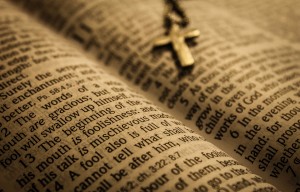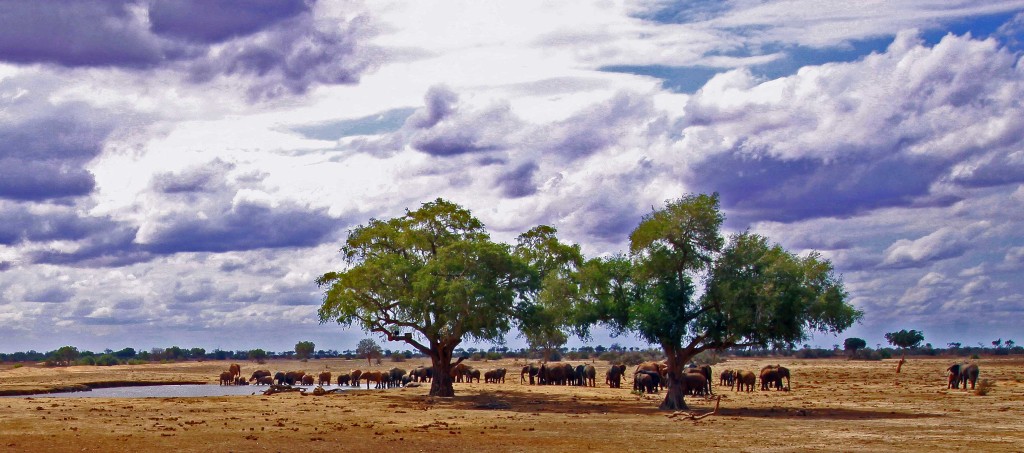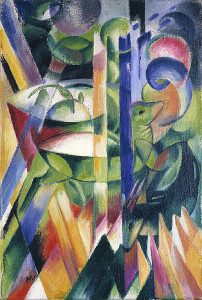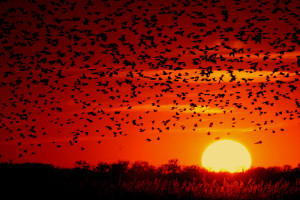 The Bible is widely considered to be the best selling book of all time and with estimated annual sales of 100 million copies, it has brought hope, inspiration, joy and love to countless generations of Christians.
The Bible is widely considered to be the best selling book of all time and with estimated annual sales of 100 million copies, it has brought hope, inspiration, joy and love to countless generations of Christians.
Yet does its pages tell of a Good News which only applies to humanity?
Despite mainstream Christianity’s long tradition of disregard for other species, might Holy scripture in fact testify to a God who is far from indifferent?
 God Creates the Animals
God Creates the Animals
Mainstream culture both Christian and secular supports a “do what we like” attitude towards animals.
Yet does the Bible actually support this? Are animals really “just animals”?
In the first chapter of Genesis humans and animals are in fact depicted as having a lot in common.
Humans and animals are made on the same day (Genesis 1:24-26).
They are also made in the same way. God does this by speaking life into the dust; animating it and breathing in life.
Genesis describes both humans and animals as “living souls” or “living beings”. The Hebrew word is nephesh and it is used in Genesis 1-2 to describe sea life, land animals, birds and humanity.
Likewise when the Bible refers to “all flesh” or kol basar in Genesis 6, it speaks of both animals and humans alike, denoting a basic kinship that all divinely made creatures share.
 Animals as Spiritual Beings
Animals as Spiritual Beings
Scripture tells of how within the dust which forms all creatures, there dwells something divine.
The writer of Genesis uses the word Hebrew word ruach, to tell of how the “wind”, “spirit”, or “breath” of God brings forth life.
Genesis 6:17 and Psalm 104 are both clear humans and animals share the same spark of life; this same ruach.
A remarkable thing indeed to consider, that according to the Bible, divine breath which animates humans is likewise shared by all creatures.
This indicates animals to be created as fundamentally spiritual beings
Spiritual, in that every purr, every bark, every roar from God’s creatures testifies to the sacred, animating force within.
 Blessed by God
Blessed by God
So what else does scripture tell us about the purpose of animals?
What do we understand when we look at a cat, a cow or an elephant?
First and foremost, scripture says these are blessed creatures.
Genesis tells of this blessing in 1:22, declaring them very good and given space to flourish.
Animals are good in and of themselves. Not good to use, abuse and treat according to human whim but good just to be.
Every creature is a blessed creature or it is no creature at all.
Later in Genesis 9:10 God brings Noah, his sons and all living creatures, from whales to ants, into a divine and holy covenant:
“I now establish my covenant with you and with your descendants after you and with every living creature that was with you—the birds, the livestock and all the wild animals, all those that came out of the ark with you—every living creature on earth.”
 Fellow Worshippers of God
Fellow Worshippers of God
As co-sharers of God’s Holy ruach, the wisdom books repeatedly remind us that the whole of creation is God’s and all creatures brought into His Holy covenant are also called to worship.
Of course, animals do not pray or sing praises as humans do.
Yet the animals who are made in love, for love and by love, by their very existence, give glory to God who is love.
Psalm 104 describes the abundant provision within creation and the dependence of all creatures on God:
“O Lord, how manifold are your works! In wisdom you have made them all; the earth is full of your creatures. … These all look to you. … When you hide your face, they are dismayed ….”
The psalmist exhorts the whole of creation to join together in the praises of the Lord:
“Praise the Lord from the earth, you sea monsters and all deeps, fire and hail, snow and frost, stormy wind fulfilling his command! … Wild animals and all cattle, creeping things and flying birds! … Let them praise the name of the Lord, for his name alone is exalted; his glory is above earth and heaven.” (Psalm 148:7-13)
 A Vision of the Peaceable Kingdom
A Vision of the Peaceable Kingdom
Creation praises and glorifies the God whose culmination of love and His covenant promise is to reconcile all things to Himself (Colossians 1:20) within a peaceable Kingdom for all creatures.
Isaiah 11:6 envisages a new world for humans and animals ushered in through the work of the Messiah.
“The wolf shall lie down with the lamb, the leopard shall lie down with the kid, the calf and the lion and the fatling calf together, and a little child shall lead them.”
Hosea 2:18 also foresees a time of peace for all creatures:
“In that day I will make a covenant for them with the beasts of the field, the birds in the sky and the creatures that move along the ground. Bow and sword and battle I will abolish from the land, so that all may lie down in safety.”
Until this vision is realised, Paul in his letter to the Roman Church (8:22) tells of how
“… the whole creation groans and suffers the pains of childbirth together until now” as it awaits its liberation.
A liberation foretold in Revelation 21:4 which speaks of a new heaven and a new earth involving the destruction of pain and death. A time when God will
“…he will wipe every tear from their eyes. Death will be no more; mourning and crying and pain will be no more…”
The animals, far from forgotten, are central to God’s redemptive plan.
As Christ’s co-labourers, how can we participate with the Holy Spirit in heralding the promised liberation of our fellow creatures?
How can we work to relieve the suffering, injustice and pain within creation?
And so become an instrument of the Spirit who, wipes away every tear.
One tear at a time.
Acknowledgments:
- Charles C. Camosy. For Love of Animals: Christian Ethics, Consistent Action. Anthony Messenger Press. 2013
- Celia E. Deane-Drummond (Author, Editor), David Clough (Editor). Creaturely Theology: on God, Humans and other animals. SCM Press. 2009.
- Andrew Linzey. Animal Theology. University of Illinois Press. 1995.
- Brian McLaren (Afterword), Tripp York (Editor), Andy Alexis-Baker (Editor). A Faith Embracing All Creatures: Addressing Commonly Asked Questions about Christian Care for Animals (Peaceable Kingdom). Cascade Books. 2012.

